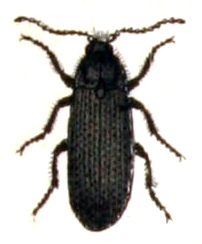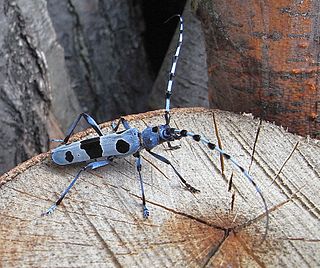
Antennae, sometimes referred to as "feelers", are paired appendages used for sensing in arthropods.

The insects of the beetle family Chrysomelidae are commonly known as leaf beetles, and include over 37,000 species in more than 2,500 genera, making up one of the largest and most commonly encountered of all beetle families. Numerous subfamilies are recognized, but the precise taxonomy and systematics are likely to change with ongoing research.
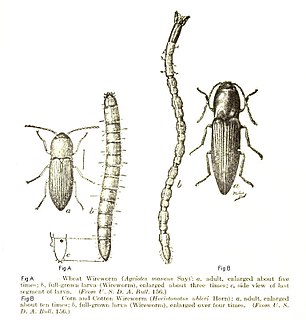
Elateridae or click beetles are a family of beetles. Other names include elaters, snapping beetles, spring beetles or skipjacks. This family was defined by William Elford Leach (1790–1836) in 1815. They are a cosmopolitan beetle family characterized by the unusual click mechanism they possess. There are a few other families of Elateroidea in which a few members have the same mechanism, but most elaterid subfamilies can click. A spine on the prosternum can be snapped into a corresponding notch on the mesosternum, producing a violent "click" that can bounce the beetle into the air. Clicking is mainly used to avoid predation, although it is also useful when the beetle is on its back and needs to right itself. There are about 9300 known species worldwide, and 965 valid species in North America.

Histeridae is a family of beetles commonly known as clown beetles or Hister beetles. This very diverse group of beetles contains 3,900 species found worldwide. They can be easily identified by their shortened elytra that leaves two of the seven tergites exposed, and their geniculate (elbowed) antennae with clubbed ends. These predatory feeders are most active at night and will fake death if they feel threatened. This family of beetles will occupy almost any kind of niche throughout the world. Hister beetles have proved useful during forensic investigations to help in time of death estimation. Also, certain species are used in the control of livestock pests that infest dung and to control houseflies. Because they are predacious and will even eat other Hister beetles, they must be isolated when collected.

Beetle is a British party game in which one draws a beetle in parts. The game may be played solely with pen, paper and a die or using a commercial game set, some of which contain custom scorepads and dice and others which contain pieces which snap together to make a beetle/bug. It is sometimes called Cootie or Bugs. The game is entirely based on random die rolls, with no skill involved.

The Australasian swamphen is a species of swamphen (Porphyrio) occurring in eastern Indonesia, Papua New Guinea, Australia and New Zealand. In New Zealand, it is known as the pukeko. The species used to be considered a subspecies of the purple swamphen.

Melanotus is a genus of click beetles in the family Elateridae. There are at least 30 described species in Melanotus.
Ektatotricha is an extinct, monotypic, genus of ant-like stone beetle in the family Staphylinidae containing the single species Ektatotricha paradoxa.
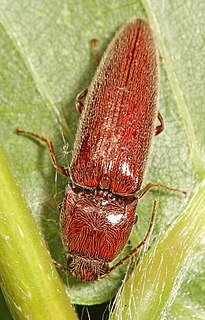
Melanotus communis is a species of click beetle. The adult beetle is reddish-brown in color, and is about 13 millimetres (0.51 in) long. The egg is white in color, and is about 0.3 mm (0.012 in) long. The larva is a short-legged wireworm. It is a pale yellow to reddish-brown in color, and is 21–25 mm (0.83–0.98 in) long when mature. The pupa is white in color, and is about the same size as an adult.

Melanotus villosus is a species of beetle in the family Elateridae and the genus Melanotus.

Crepidodera aurata also known as willow flea beetle, is a species of flea beetles from the Chrysomelidae family, described by Marsham in 1802. It can be found in Palearctic realm and to the east of Korea. Can be found in Wales.

Vesperus luridus is a species of beetle in the Vesperidae family

Phyllopertha horticola, the garden chafer or garden foliage beetle, is a beetle from the family Scarabaeidae. Phyllopertha horticola was described by Carl Linnaeus in his landmark 1758 10th edition of Systema Naturae.

Xylosandrus compactus is a species of ambrosia beetle. Common names for this beetle include black twig borer, black coffee borer, black coffee twig borer and tea stem borer. The adult beetle is dark brown or black and inconspicuous; it bores into a twig of a host plant and lays its eggs, and the larvae create further tunnels through the plant tissues. These beetles are agricultural pests that damage the shoots of such crops as coffee, tea, cocoa and avocado.

Pseudocordylus melanotus, also known as the common crag lizard or Highveld crag lizard, is a species of lizard found in Eswatini, Lesotho, and South Africa. Pseudocordylus subviridis is considered a distinct species by the Reptile Database, but a subspecies of Pseudocordylus melanotus by IUCN.
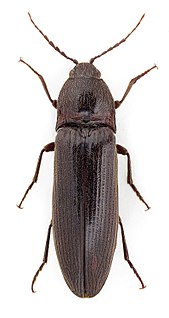
Melanotus castanipes is a species of click beetle in the family Elateridae.

The Christmas Island flying fox or Christmas Island fruit bat, as the name suggests, is a flying fox endemic to Christmas Island. It is unclear if it should be considered a distinct species, or a subspecies of the black-eared flying fox. It may descend from a population of island flying foxes from Pulau Panjang near Java.
Porrorhynchus indicans, is a species of whirligig beetle found in Sri Lanka.
Melanotus cribriventris, is a species of click beetle found in India, Sri Lanka, China and USA.
Melanotus punctosus, is a species of click beetle found in India, Sri Lanka, Pakistan and Hawaii.
